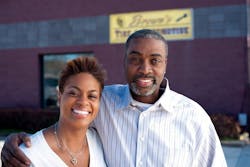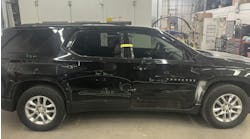For people who fall in love with cars, the romance often starts at an early age. Whether it’s playing with toy cars as a child or hanging around an older relative’s garage, car people who fall hard, fall early.
Women—girls—are no exception. As part of our annual issue dedicated to “Women in Collision Repair: Celebrating women who contribute in big ways to the industry,” FenderBender talked to three young women in the industry to find out what drew them to cars and collision repair. The common theme: They were exposed to cars from an early age, either in their community or in their own family. These three remarkable women—award-winners, future shop owners, pioneers—share their experiences of working in a male-dominated industry, and give tips and advice to shop owners who want to attract women to the industry, and to other women considering a career in collision repair.
The Family Woman
Tonnika Haynes was three years old when her dad opened Brown’s Auto & Collision Center Inc. in Chapel Hill, N.C., so she essentially grew up in the shop. In high school she worked there filing invoices and answering phones during summer vacation.
Haynes has always wanted to be where her dad was. “If he was in the shop that’s where I was going to be. I love it,” says Haynes. “I don’t think I would do anything different as far as a job goes.”
Encourage young women in your own family to work in the industry. Haynes’ four-year-old son loves being a part of the family business. “If there’s work going on, he’s out in the shop getting as dirty as the mechanics.”
Haynes has been working at Brown’s fulltime since graduating in 1999 with a degree in business administration, and in 2002, she was one of Akzo Nobel’s Most Influential Women in the industry for her work as manager of the day-to-day operations of the 17,000-square-foot shop.
Though customers may look for a man to help them when they come into Brown’s, talking with customers is Haynes’ favorite part of the job. “We usually have older customers because we’re close to a lot of retirement homes, so I have grown to love my customers very dearly,” says Haynes. “I love making people happy.”
Haynes credits her father for instilling a love for collision repair in her from a young age. Her father never let her think she couldn’t do the job because she was a woman.
“I’m a dominant woman and I don’t take it if customers turn their nose at me or if they ask to speak to ‘whoever’s in charge,’” says Haynes. “My dad lets them know it’s me. I had a harder time when I was younger, but now I’m pretty much in control.”
The Estimator
Kristen Rothfuss’ love for cars started with her older brother, who was always out in the garage working on his car. Like a true little tag-along, Rothfuss was out there with him as much as she could be.“I was always interested in what he was doing,” says Rothfuss of her brother Paul. “I was always hanging out in the garage with him while he worked on his Mustang.”
Even though Rothfuss planned on being a history teacher, she got a part-time job in college at a Ford dealership taking care of lease turn-ins, accounts receivable, and eventually, sales. “I enjoyed it, but the pay at a dealership in sales is not steady,” says Rothfuss. “And I really wanted to go to the other side of the coin and do something more hands-on.”
So she looked for a job on the collision side and applied at Nu-Look Collision Centers in Rochester, N.Y. She’s been there for three years now as an estimator and couldn’t be happier.
“My favorite part of the job is taking the car back to the customer,” says Rothfuss. “When they drop their car off, it’s in shambles. And to deliver it back to them and show them that it’s OK is the best part.”
Invest in collision repair education for girls at the high school level, because it’s in high school that young people become curious about
a career.
Part of the reason Rothfuss sticks with it is that she likes being a woman in a male-dominated industry.
“It’s been a primarily male-dominated field for so long that I don’t think it’s even considered by women as a career path,” says Rothfuss. “I know that if the idea of working in the collision industry had been presented to me earlier on, I would’ve definitely considered that rather than pursuing a college degree in a field that I wouldn’t use. I enjoy being a woman in the car business because it’s challenging and it’s different to see a woman selling cars or financing cars or writing estimates,” says Rothfuss.
The icing on the cake: Her idolized older brother is now one of Rothfuss’ customers. “It’s funny seeing what his little sister can do for him,” says Rothfuss.
The Technician
When she was a little girl, Soraya Gonzalez often walked past La Palma Park in Anaheim, Calif. La Palma wasn’t just any park; it was the site of car shows all summer long, and the place that first sparked Gonzalez’s interest in cars.“It seemed that every summer they had a car show (there),” says Gonzalez. “I can remember that they would just be lined up on the streets and in the park. I never actually looked at the cars up close. I just admired them while I passed by.”
Even though 21-year-old Gonzalez was always interested in cars growing up, she didn’t dream of becoming a collision repair technician until it was time to decide what to study in college. She initially went to the College of Western Idaho for her collision repair studies. Now, she is at Boise State University finishing her degree in business and fine arts.
“I kind of just landed in collision repair. I’m someone who likes to work with my hands and to do artistic things,” says Gonzalez. “I really wanted to learn to paint cars and make them pretty.”
Having interned at shops for college, Gonzalez knows how it feels to be a woman in a male-dominated industry. Initially, it’s intimidating to work in a shop where it’s usually all male technicians, says Gonzalez.
It’s important to foster an environment of respect and support for women in your shop. That means not noting differences between men and women—even in a joking way. “If you want more women in your shop, you have to consciously show that you want to work with them by not giving women a hard time.”
“They are wary of new people and sometimes even more so of females because they don’t know what to expect.” But she was never turned away from a shop because she was a woman. “If someone had an issue with the fact that I was there, I didn’t worry about it. It was their problem to deal with as they saw fit.”
Gonzalez’s spunk and love for the industry has spelled early success for her. In 2010 she took seventh place in the automotive refinishing technology category at the SkillsUSA competition. She was also the top-scoring female, and because of that she received the Women’s Industry Network (WIN) scholarship to attend NACE, and she also got a 2011 WIN membership.
But in the end, it’s not about being a woman, says Gonzalez, who hopes to have her own shop someday. “It’s about working hard and doing what you’re good at. I just happen to kick ass at what I do and am better than some guys in a male-dominated industry.”



